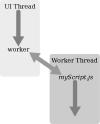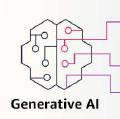|
Take a break and catch up with the latest articles, book reviews and news posted on this site. This week Harry Fairhead explores the question "what do we mean by intelligence in practical terms. and argues that an operational definition of intelligence might be better than a theoretical one and, for JavaScript programmers, Ian Elliot explores the basic worker thread.
To receive this digest automatically by email, sign up for our weekly newsletter.

April 13 - 19, 2023
Featured Articles
|
JavaScript Async - Basic Worker
17 Apr | Ian Elliot

Until recently JavaScript has had no way to use any thread of execution other than the UI thread. For a language that was designed to work in an asynchronous event handling environment this is surprising. Today modern JavaScript does have additional threads and it is important to know how to use them.
|
The Paradox of Artificial Intelligence
14 Apr | Harry Fairhead

The emergence of large language models such as GTP4 has revitalized the question of what do we mean by "intelligence" in practical terms. And once we adopt an operational definition does it defeat the whole idea of "artificial intelligence"? The solution might be to realize that intelligence isn't a property, but a relationship.
|
|
Programming News and Views
|
Introducing OSS Insight
19 Apr | Janet Swift

OSS Insight will tell you everything you ever wanted or needed to know about GitHub projects and developers. It is open source and its API is available to all/
|
Amazon's AI Wake-Up - Free Code Assistant
19 Apr | Mike James

Amazon is a company that you might expect to be at the front of commercializing AI - after all they have the computing power in AWS and the expertise in the form of Alexa. In a bit of a catch up maneuver Amazon is now offering a free code assistant, CodeWhisperer and promises more.
|
Python Software Foundation Raises EU Open Source Concerns
18 Apr | Kay Ewbank

The Python Software Foundation (PSF) is concerned about plans by the European Union (EU) regarding distributing open source software.
|
PlanetScale's MySQL Course For Developers
18 Apr | Nikos Vaggalis

Here's a free course on MySQL with a focus of using it as a Developer. While it is taught by Aaron Francis, Developer Educator at PlanetScale, the serverless MySQL platform, it applies to any MySQL instance and isn't PlanetScale-specific.
|
Manifest 2 Stay Of Execution Further Extended
17 Apr | Ian Elliot

Developers who are concerned about the phasing out of Manifest V2 can rest assured that it won't happen any time soon. Google will provide at least 6 months notice before beginning any experiments to turn it off in the browser and this is shunted into "next year".
|
Apache EventMesh Reaches Top Level Status
17 Apr | Kay Ewbank

Apache has announced that Apache EventMesh has graduated from incubation and is now a Top-Level Project. EventMesh was developed by WeBank, and can be used in event-driven and serverless architectures to make it easier to develop event-driven apps in complex distributed systems.
|
Microsoft Researcher Awarded 2022 ACM Prize In Computing
16 Apr | Sue Gee

Yael Kalai, Senior Principal Researcher at Microsoft Research and an Adjunct Professor at MIT, is the recipient of the 2021 ACM Prize in Computing for her work on cryptography.
|
Lightbend Releases Java SDK For Kalix
14 Apr | Kay Ewbank

Lightbend has released a Java SDK for Kalix. Lightbend produces cloud-native microservices frameworks while Kalix is a Platform-as-a-Service, developed by Lightbend, that combines an API-first, database-less programming model with a serverless runtime.
|
Learn Spring with React and MongoDB
14 Apr | Nikos Vaggalis

In this FreecodeCamp course, you will learn how to create a full stack application using MongoDB for the database, Java and Spring Boot for the back end and React for the front end.
|
Meta Releases Buck2 Build System
13 Apr | Alex Denham

Meta has released a new open source version of Buck, its internal build system. Buck2 is described as twice as fast as its predecessor.
|
Fiberplane Adds Metrics Tool
13 Apr | Kay Ewbank

Fiberplane has announced Autometrics, a set of open source libraries for understanding the performance of your code in production. It provides Grafana dashboards and Fiberplane notebooks to visualize the metrics of how your code is performing.
|
|
|
Books of the Week
If you want to purchase, or to know more about, any of the titles listed below from Amazon, click on the book jackets at the top of the right sidebar. If you do make Amazon purchases after this, we may earn a few cents through the Amazon Associates program which is a small source of revenue that helps us to continue posting.
|
Full Review
|
Data Structures The Fun Way
Author: Jeremy Kubica
Publisher: No Starch
Pages: 304
ISBN: 978-1718502604
Print: 1718502605
Kindle: B09WJYH4KL
Audience: Developers interested in data structures
Rating: 4.5
Reviewer: Kay Ewbank
This book looks at what lies behind data structures and how this relates to solving complex problems with the aim of providing new insights into how to use the underlying structure of your data to be more efficient.
|
Book Watch
|
Graphical Data Analysis with R (Chapman & Hall/CRC)
This book shows what information can be gained from graphical displays. Antony Unwin focuses on why you draw graphics to display data and which graphics to draw (and uses R to do so). All the datasets are available in R or one of its packages. The book guides you in choosing graphics and understanding what information you can glean from them, such as data cleaning, exploring data structure, detecting outliers and unusual groups, and identifying trends and clusters.
|
Implementing Event-Driven Microservices Architecture in .NET 7 (Packt)
This book is a guide to implementing event-driven microservices architecture using C# 11 and .NET 7. Joshua Garverick and Omar Dean McIver cover the new features of .NET 7 that will make developing applications using EDA patterns easier, and how the core tenets of domain-driven design are implemented in .NET 7.
|
An Elementary Introduction to the Wolfram Language 3rd Ed (Wolfram Media)
This book provides an elementary introduction to the Wolfram Language and modern computational thinking. Stephen Wolfram, the creator of the Wolfram Language as well as Wolfram|Alpha and Mathematica, assumes no prior knowledge of programming, and the book is suitable for both technical and non-technical college and middle-to-high-school students.
|

I Programmer has reported news for over 12 years. You can access I Programmer Weekly back to January 2012 for all the headlines plus the book reviews and articles.
To keep up with the latest news and receive this digest automatically by email, sign up for our weekly newsletter and follow us on Twitter, Facebook, and LinkedIn , where you are welcome to share all our stories.
You can also subscribe to our RSS Feeds - we have one for Full Contents , another for News and also one for Books with details of reviews and additions to Book Watch.
Send your programming press releases, news items or comments to : NewsDesk@i-programmer.info
<ASIN:1871962528>
<ASIN:1871962765>
<ASIN:1718502605>
<ASIN:1032477318>
<ASIN:1803232781>
<ASIN: 1944183078> |















